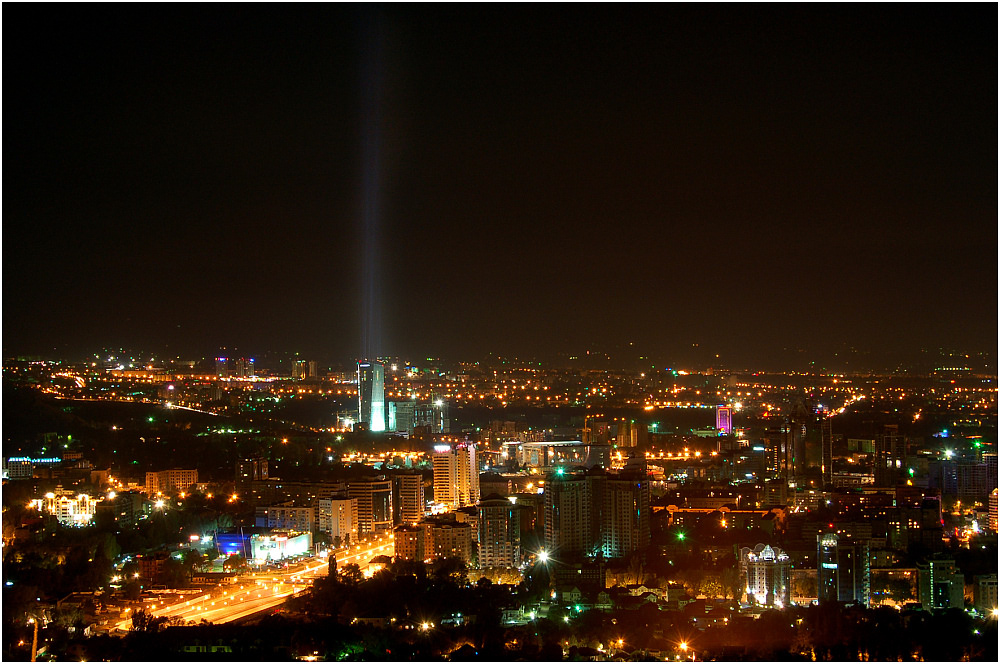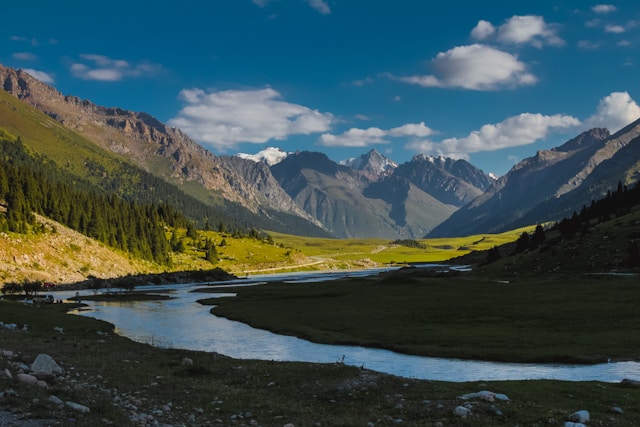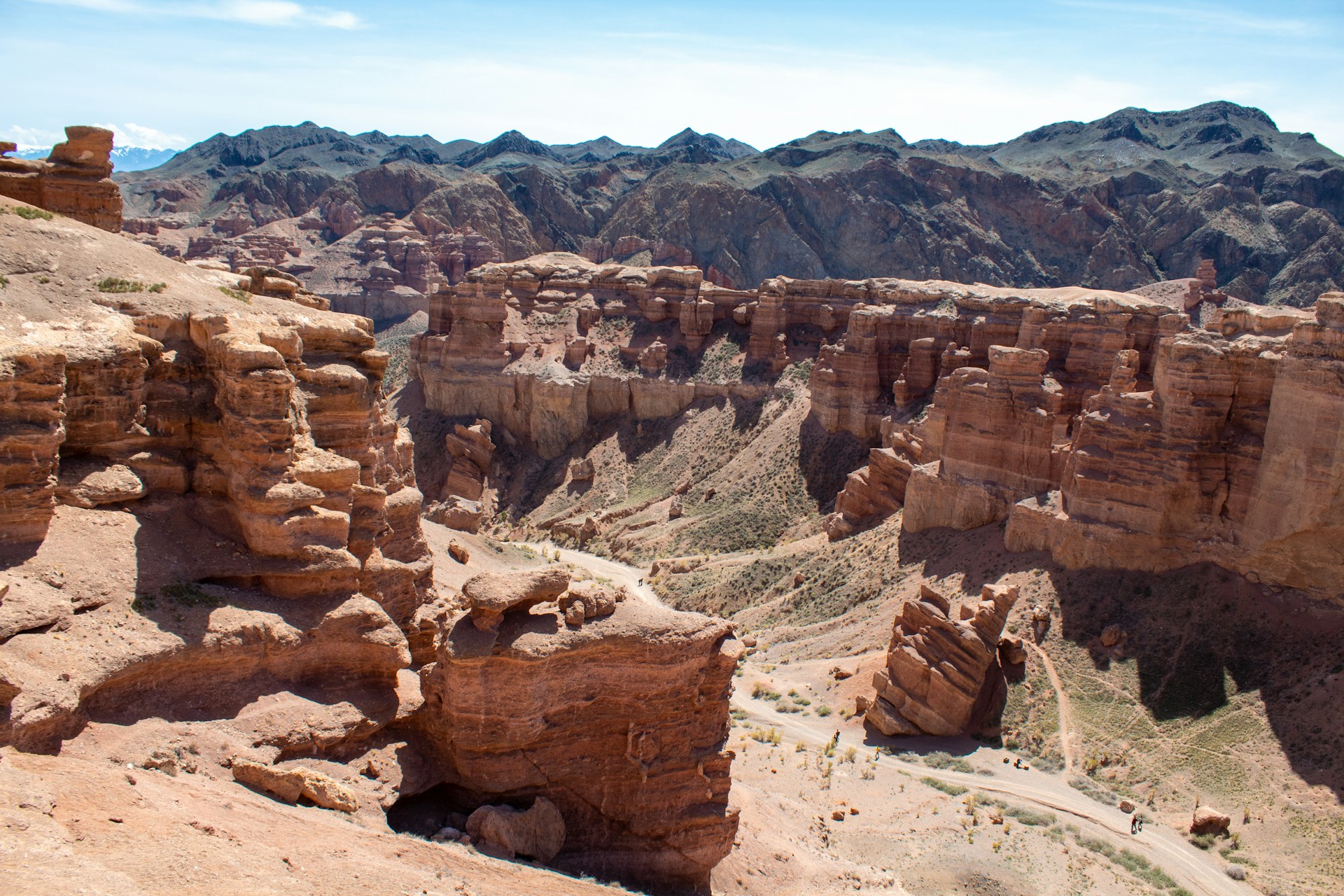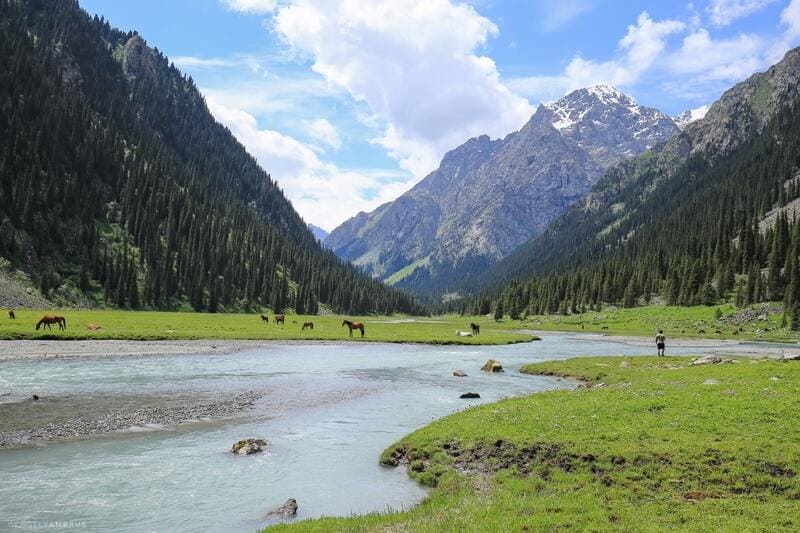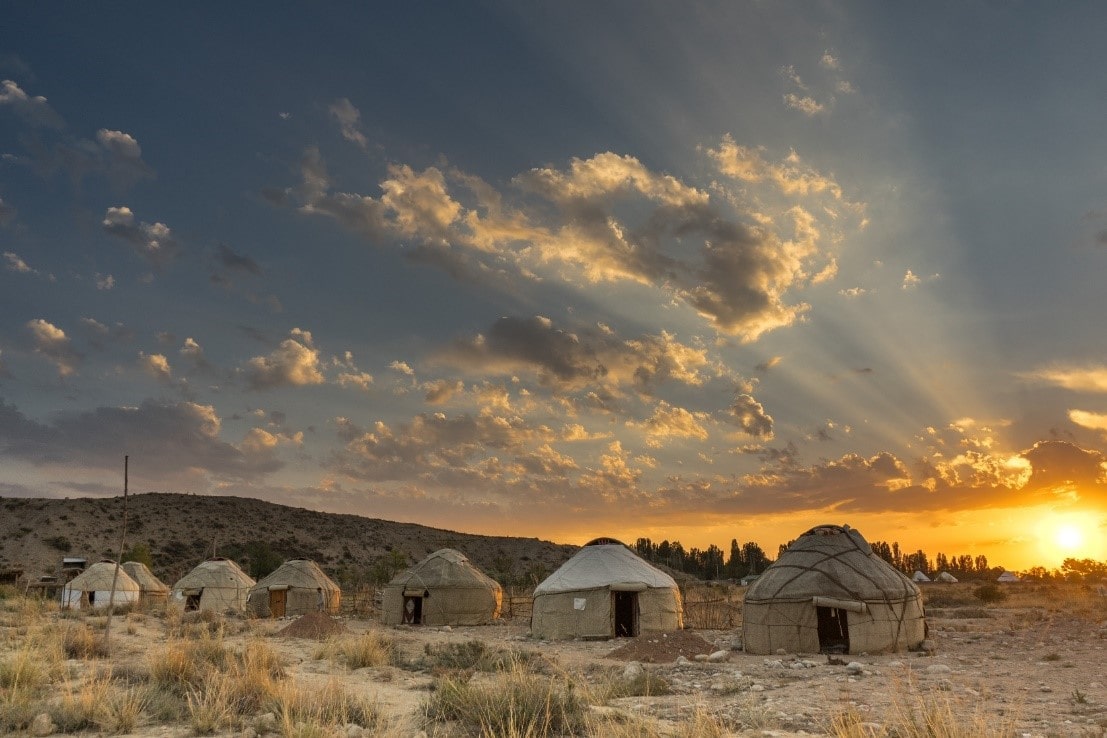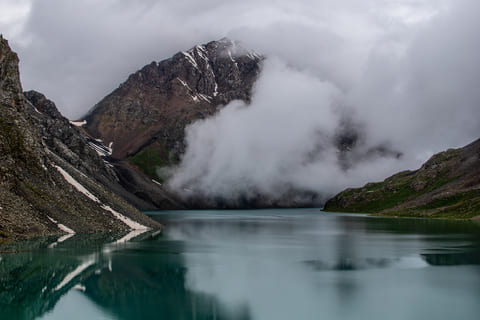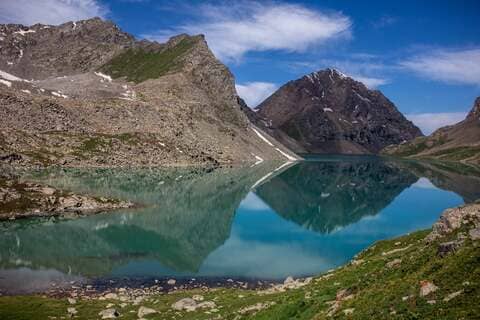10 days
Day 2
- Breakfast: Hotel
- Lunch: Restaurant
- Dinner: Guest House
- City tour
- Hiking
Breakfast.
Short city tour in Almaty.
Transfer to Charyn canyon.
You will admire the view! Walk around 3 km through the maze of the Castles Valley with its walls of bizarre shapes overhanging you. The bottom of the Canyon has slight descend to the end of the walk, where you will get to the fresh oasis on the bank of icy cold Charyn river. Picnic.
After we cross Kegen border to Kyrgyzstan.
Transfer to Karakol.
On the way we will stop by Santash stones. The grandiose monument of stones is a symbol of the mound complex, located near the San Tash pass. The center, which is a large mound with a stone embankment, is known under the same name – “San Tash”. Around him are grouped the other mounds with earthen and stone-earthen and stone embankments. This pass is associated with the name of the great commander and conqueror Tamerlane.
By arrival to Karakol accommodation in hotel.
Dinner in restaurant.
Day 3
- Breakfast: Guesthouse
- Lunch: Lunch Box
- Dinner: Yurt Camp
- Trekking
After breakfast we drive to Turgen gorge. The valley is surrounded by high mountain peaks on all sides and provides access to the mountain pastures of the country and to the famous peaks of Victory and Khan Tengri.
We will stop by the river and meet the team who will take care of us for the trekking part. Beginning of our 6 days trekking tour. we ascend to the Boz Uchuk-Ashuu Pass. The Boz Uchuk Pass is 3460m high, and one of the easy passes in our route. Lunch on top of the pass. The camp located below the the Boz Uchuk Lakes (located at the same altitude as the pass).
Little rest and we go to see the lakes. We can watch sunset over the valley from a nearby viewpoint. Overnight in yurts (Elevation: 3220m).
Distance: 12km
Walking hours: 6-7h
Day 4
- Breakfast: Yurt Camp
- Lunch: Lunch Box
- Dinner: Yurt camp
- Trekking
Trekking distance: 7 km+ 6km to waterfall and back
Walking hours: 5-6h
Breakfast.
This day's route starts by crossing the small ridge immediately West of camp and descending to the main valley floor below. We will follow the trail uphill as it parallels the river for around 2km before crossing and heading more steeply uphill to the obvious pass in the distance at 3524m.
From the top, the Jergez valley spreads out below and an excellent view of Tashtanbek Tor Bashi peak dominates the southern horizon. Descend down to the camp and lunch.
After lunch we hike to the waterfall and back(optional). Overnight and dinner in yurts
Day 5
- Breakfast: Yurt camp
- Lunch: Lunch box
- Dinner: Yurt camp
- Trekking
Breakfast.
This day's route starts by crossing the small river immediately West of camp and ascending to the Ailanysh lakes. Little rest near the lake Ailanysh. The climb steepens past the second lake, up to the Ailanysh Pass at 3676m.
About 5km into this final descent of the day, as the trail curves to just above the main branch of the Ak-Suu river, we can see unbelievable views down towards an unnamed 3855m peak and the blinding snowy whiteness of the Ak-Suu Wall's glaciated slopes.
Overnight in yurts (Elevation: 2800m).
Day 6
- Breakfast: Yurt camp
- Lunch: Lunch box
- Dinner: Guest house
- Trekking
Today's a relatively easy day, distance-wise, but it begins with an 800m+ climb Ortok pass (3650 m).
The trail continues along the East side of the river to the main Ak-Suu Arashan valley.
After lunch small walking to the wild hot springs and taking a dip in the hot springs that have made the valley locally famous since before the Soviet era. Rest up tonight, because tomorrow is a long but rewarding uphill day.
Overnight guesthouse (Elevation: 2500m).
Trekking distance: 14 km
Walking hours: 5-6h
Day 7
- Breakfast: Guest house
- Lunch: Lunch Box
- Dinner: Yurt camp
- Trekking
Breakfast.
Today we go to cross another pass which called Ala-Kul pass. From Altyn Arashan, cross the large bridge over to the West side of the Ak-Suu River and continue South for just over 2km to the first large valley that rises off to the Southwest.
From the turn out of the Arashan valley it's around an 8km uphill that rises from 2570m at the valley floor to 3906m at the Ala-Kol North pass, with the last 200m of elevation feeling nearly-vertical as it rises through loose scree over which two obvious paths have been stomped out by the multitude of hikers that hike up Issyk-Kol's most popular trekking route.
The views from the top of the pass are something sublime, though, taking in an incredible panorama of 5000m+ peaks and the breadth of Ala-Kol lake. This day we will camp next to the Ala-Kul lake. Overnight in the tent (Elevation: 3550m).
Trekking distance: 15 km
Walking hours: 7-8h
Day 8
- Breakfast: Yurt Camp
- Lunch: Yurt camp
- Dinner: Restaurant
- Trekking
- Sightseeing
From the camp, we will continue to the west.
Today it is mostly downhill.
11km to the net camp in Karakol gorge and we will be picked up by car to Karakol. There are few other camp sites with the yurts on the way. Our end point used tobe a alpine base camp in Soviet time. We will have some tea in the camp and drive further to Karakol.
Accommodation in hotel. Dinner in restaurant.
Trekking distance: 10 km
Walking hours: 4-5h
Day 9
- Breakfast: Hotel
- Lunch: Restaurant
- Dinner: Restaurant
- Hiking
- Eagle hunting
After breakfast we will drive to Bokonbaevo village on the south shore of Lake Issyk-Kul.
The landscape around the Issyk Kul varies dramatically. After grassy hillsides, we find bare, desert landscapes lined with red sandy hillsides on one side and sea-sized Issyk Kul on the other.
One the way, we will visit the Fairytale Skazka Canyons and red rocks of Jeti-Oguz gorge, where we will stop for lunch and also see Eagle hunting demonstration.
Transfer to Bishkek.
Dinner in restaurant.
Day 10
After breakfast we will shop in a department store, GYM and looking around Bishkek city in the morning.
Transfer to Almaty International airport via Kordai border and have lunch on the way to Almaty. Flight back home.
DAY FACTS
- Breakfast: Hotel
- Lunch: Restaurant
Included:
- Transport Sprinter, Gaz 66
- Accommodation (hotels, guest houses, yurts, tents)
- Guide
- Meals
- Horses for luggage
- Entrance fees
- Eagle hunting
- Master class
- Folklore concert
- Hot springs
Not Included:
- Fly ticket
- Insurance
- Alcohol
- Single supplement
Useful information
Clothing
- Layered Clothing: To adjust to varying temperatures, bring lightweight, breathable layers for daytime activities and warmer layers for cooler evenings.
- Waterproof Jacket and Pants: Essential for protection against rain and wind.
- Comfortable Hiking Boots: Sturdy, well-fitting boots with good ankle support are crucial for trekking and hiking.
- Warm Hat and Gloves: Even in summer, higher altitudes can be chilly.
- Swimwear: For potential swimming opportunities in lakes or hot springs.
Gear
- Daypack: A comfortable backpack for carrying essentials during daily activities.
- Sleeping Bag: While provided at camps, you may prefer your own for added comfort.
- Headlamp or Flashlight: For use in yurts, tents, and during night activities.
- Reusable Water Bottle: Stay hydrated and reduce plastic waste.
Personal Items
- Sunscreen and Lip Balm: High SPF to protect against strong mountain sun.
- Sunglasses: With UV protection.
- Personal Medications: Ensure you have enough for the entire trip.
- Toiletries: Biodegradable soap, toothpaste, toothbrush, and other personal hygiene items.
Documents and Money
- Passport and Visa (if required): Ensure your passport is valid for at least six months beyond your travel dates.
- Travel Insurance: Including coverage for trekking and horseback riding.
Miscellaneous
- Camera and Batteries: To capture the stunning landscapes and memorable moments.
- Power Bank: To charge your electronic devices when outlets are unavailable.
- Notebook and Pen: For journaling your experiences or jotting down important information.
FAQ
1.Physical Fitness: The trek involves moderate to challenging terrain with steep ascents and descents. A good level of cardiovascular fitness is important. If you regularly engage in activities like hiking, running, or cycling, you should be well-prepared.
2.Duration of Trekking: You will be trekking for several hours each day (5-6 hours on average), so it’s helpful to have endurance for sustained activity.
3.Altitude: The trek reaches elevations up to 3,650 meters (11,975 feet). If you have not hiked at high altitudes before, it may take some acclimatization, and you should be aware of altitude sickness symptoms.
4.Preparation: Prior training can help. Incorporate hikes with elevation gain into your routine, and practice carrying a daypack.
5.Consult a Professional: If you have any health concerns or pre-existing conditions, consider consulting a healthcare provider before undertaking the trek.
If you regularly engage in physical activity and are comfortable with longer hikes, you should be fit enough for this adventure!
1.Water Availability: Fresh water is usually available from natural sources along the trekking route. Make sure to refill your water bottles whenever you have the opportunity.
2.Water Purification: It’s advisable to purify water from natural sources to prevent illness. You can use water purification tablets, filters, or boil water to ensure it’s safe to drink.
3.Hydration Tips:
- Drink Regularly: Don’t wait until you’re thirsty to drink water. Aim to drink small amounts regularly throughout the day.
- Monitor Color: Check the color of your urine; pale yellow indicates good hydration, while dark yellow may indicate dehydration.
- Electrolytes: Consider bringing electrolyte tablets or powders to add to your water, especially if you’re sweating a lot.
4.Daily Intake: Aim to drink at least 2-3 liters of water daily, more if you’re sweating heavily or if the weather is hot.
5.During the Trek: Carry a refillable water bottle or hydration system in your daypack for easy access while hiking.v By staying well-hydrated, you’ll maintain your energy levels and enjoy your trekking experience more!


